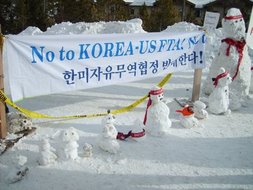Democratic Leadership Turn Their Backs on Labor and Progressives
By Young Choe*
It’s been over 120 days since Democrats regained control over Congress, but one could hardly tell by the recent trade deal struck between the Democratic leadership with the Bush administration. Democrats have stayed the course on some promises made during the mid-term elections, like securing a timetable for withdrawing troops, but on the issue of trade, which rocked the vote and mobilized the masses, the Democratic leadership has turned their backs on the working class and progressives who put them in power.
The Democrats, led by House Speaker Nancy Pelosi, House Ways and Means Chair Charles Rangel, and Senate Finance Chair Max Baucus, struck a deal with the Bush administration that lobbyists for multinational corporations are declaring will pave the way for Congress to pass four bilateral trade agreements, including Panama, Peru and Korea, and extend Fast Track authority to President Bush.
“Pending U.S. free trade agreements will be amended to incorporate key Democratic priorities,” read a press release from Congresswoman Nancy Pelosi trumpeting this compromise, which was then substantiated with vague rhetoric on fair trade, workers’ rights and environmental protections. I'm really glad that Pelosi is against things that most Americans agree are bad, like child and slave labor. But saying that core labor and environmental standards will be included—but not enforced—in agreements that just expand the failed NAFTA model is an affront to the auto workers who will be laid off in Detroit. We haven’t actually seen the legislation, but if statements by K Street lobbyists are accurate, the compromise fails to grant unions the right to go to courts to demand the enforcement of labor laws while granting multinational corporations greater rights to sue sovereign local, state and federal governments for laws that protect us.
Worse, if Democrats extend Fast Track to President Bush, they will not only sign over to this lawless president the exclusive right to negotiate massive trade deals. They will never realize the trade agenda put forth by freshmen Democrats and their progressive colleagues who have consistently demanded a “trade policy which will work for America’s working families, farmers, businesses, the environment and our local communities.”
As a Korean American, I don't want to pit American workers versus, say, Korean workers. The Korean Metalworkers Union is just as opposed to the Korea-US Free Trade Agreement as the UAW, and both view this trade agreement as an opportunity for multinational corporations to reap more off the backs of working people of both nations. In this globalized economy, workers are forced to build solidarity across national borders as the landscape is not so clearly drawn: the U.S. automaker GM owns South Korean Daewoo Motors, and Hyundai sets up shop in the South, where labor is not as strong as in Detroit. Workers in South Korea and the United States also share in common their struggle against ever encroaching multinational corporate power over the democratic process.
Ever since the Korea-US Free Trade Agreement negotiations began, it has been shrouded in secrecy, and the deal made by the Democratic leadership with the Bush Administration is more of the same. Americans have heard virtually nothing of this trade agreement, even though it is set to be the second largest trade deal since NAFTA. Six weeks after U.S. and South Korean negotiators claimed a deal, not only has the text still not been released to the public, the Bush Administration and the Democratic leadership are attempting to finalize a deal even before the text has been released to the American and Korean public!
It has been well-documented that the Roh Moo-Hyun government has quashed dissent by shutting down public hearings, denying the airing of an advertisement produced by peasants and filmmakers about the dangers of the FTA, and outlawing public protest of the FTA. The government broke into nine regional offices of the Korea Alliance Against the Korea-US FTA (KoA), arrested trade unionists and movement leaders, and deployed police violence using clubs and water cannons against protestors. As trade negotiators frenetically worked to sign the trade deal minutes before the April 1 deadline, Heo Seowook, a 54-year old South Korean taxicab driver, set himself on fire in protest of the FTA. Over one week later, he died from second-degree burns. This act of sacrifice symbolizes the desperation felt by working people around the globe due to spiraling housing and health costs, and anxieties over wages and job security--desperation to be further worsened by FTAs. In their imaginary world, free traders tout the miracles of neoliberal economics. In the real world, free trade has consistently hurt ordinary workers and farmers around the world.
For far too long American workers have trusted Democrats to put forth a trade agenda that protects us from corporate piracy, only to be reminded time and again that many Democrats are beholden to the very same corporations controlling Republicans. In 2006, 37 brand new Democrats were elected on a fair trade platform that gave Democrats the majority in Congress. The buzz in Washington is that the freshmen democrats are hard at work to fulfill their campaign promises. It’s time for the Democratic base—labor and progressives—to remind the Democratic leadership that they must be held accountable to the people that gave them power and stop ceding it to the Republicans and corporations driving the free trade agenda.
* Young Choe works at the Nodutdol for Korean Community Development in Queens, New York and is a member of Korean Americans for Fair Trade.

No comments:
Post a Comment